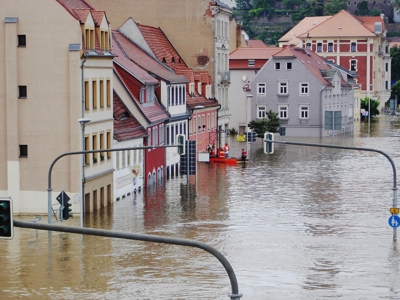
A backed-up, overflowing toilet or sink can be distressing enough for a commercial property owner or small business. When there's actual sewage involved, a minor inconvenience can turn into a serious and potentially hazardous clean-up situation. Use this guide from the experts at ServiceMaster Restore to learn what you should do immediately after a sewer backup occurs, plus tips on how you can prevent them from happening in the future.
Sewer Backup: Here's What to do
Cleaning a sewage backup in your office isn't a basic cleaning task. Handling sewage is extremely hazardous, so the clean-up process should only be completed by professionals. If you notice any signs of sewage backup, call a professional company immediately so they can remedy the issue and get your business back to normal.
Experts in the field know how to avoid any health risks while they safely remove all biohazards. A professional cleaning crew can effectively handle the following sewage clean-up tasks:
Sewage Backup Signs
Are you concerned you might have a sewer backup? The most important thing is identifying the issue early on before it becomes a mess that ruins your day. Below are the top signs that you have a plumbing emergency brewing.
- Foul Odors
- Slow Drains
- Clogged or Overflowing Toilets
- Bubbling & Gurgling Noises in Plumbing
- One Plumbing Fixture is Affected By Use of Another Plumbing Fixture
Common Causes Of Sewer Backup Problems
Sewage issues can be hard to remedy but knowing what causes them in the first place can help you prevent the worst from happening. Some of the most common reasons why commercial buildings experience a sewer backup include the following:
- Cracked Pipes Or Misaligned Connections & Joints In Your Plumbing System
- Infiltration Of Pipes & Plumbing From Tree Roots
- Grease Build-Up & Improper Flushing Habits In The Building
- Irregular Cleaning & Maintenance, Especially In High-Volume Commercial Settings Where Maintenance Is Crucial
- Soil Settlement In & Around Your Building, Stressing Your Plumbing & Sewer System
Types Of Sewer Pipes
Not all sewer pipes are created the same, and the type of pipe your sewer is made of could have an impact on future issues.
- Cast Iron Pipes. Typically found in older homes. Even though this type of piping material is strong, it is prone to corrosion and sewer backups. Once a cast iron pipe reaches the end of its life cycle, it will start to crack.
- Clay Pipes. These have a long lifespan but are susceptible to tree root infiltration and sewage backups. Clay does not provide a reliable seal against water, meaning that the water leaks and attracts roots.
- Orangeburg Pipes. Once a popular choice because of their lightweight design and versatility. However, they were found to be very brittle, and are no longer used in residential plumbing systems.
- PVC & ABS Pipes. These pipes are widely used for their flexibility, affordability, and durability.
How To Prevent Sewer Backups In Your Building
Contaminated water and sewage issues in your building can be extremely dangerous. Luckily, a few preventative maintenance tasks can keep them from happening in your business. Follow these guidelines to reduce your risk of sewage contamination in your building:
- Have Your Sewer & Plumbing Systems Inspected At Least Annually
- Use A Water Pressure Reducing Valve To Limit Stress On Your Building's System
- Add Pop-Up Sewer Release Valves If Your Plumbing System Does Not Already Have Them
Dealing with sewage clean-up is a difficult job that should be left to the experts. If it's not properly cleaned and disinfected, your company could pose a dangerous health hazard to all employees and customers who enter your building. To help keep everyone safe, call the professionals at ServiceMaster Restore. Our commercial sewage backup clean-up services include deep cleaning and eliminating any lingering bacteria and germs from items exposed to contamination, leaving you with a fully sanitized work environment. With our expert processes, training, and experience, we can help get you back to business, fast. We’re here to help 24/7/365, call the experts at ServiceMaster Restore today at 1-800-RESPOND.


